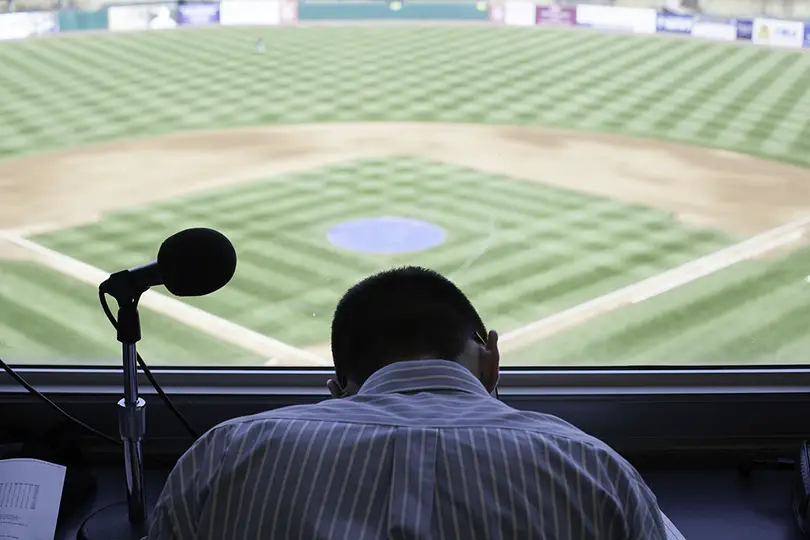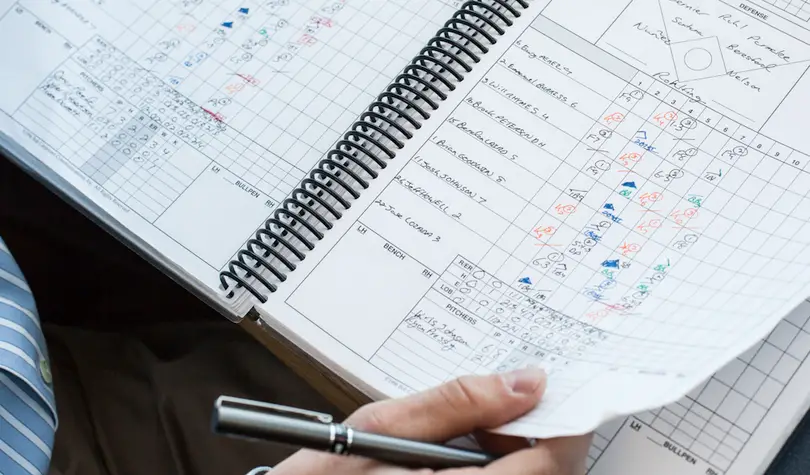His calling: Jason Benetti uses disability as motivation to achieve career success in announcing
Jason Benetti had already answered the question once.
Now having to entertain the follow-up touched a nerve.
Walking through the terminal of Newark Liberty National Airport, a security officer stopped and politely asked if he needed a ride.
“No, thanks,” Benetti said.
It was a question that he’s been asked before. Hampered by a noticeable crutch in the way he walks due to his cerebral palsy, unwanted sympathy is something Benetti often declines.
“Are you sure?” the security officer asked.
This time, Benetti was mad.
“How could I not be sure?” Benetti quipped. “I’ve given you my answer. I didn’t deliberate.”
For Benetti, the moment insulted his capabilities. But it also provided him with an opportunity to consider a different perspective.
“I need to realize that not everybody parses words like I do,” he said, reflecting on the incident. “Not everybody puts value on words like I do.”
***
Benetti has made a living with his words. A fifth-year broadcaster for the Syracuse Chiefs, and part-time play-by-play man for ESPN, Benetti has always had a passion for words, ever since calling video games alone in his room as a child.
But his words are also a way to prove people wrong. A way to change perception. Cerebral palsy, a disease that affects the nervous system, was something Benetti developed after battling a lung disorder at birth that almost cost him his life.
Today, Benetti struggles to look people in the eye. When he walks, his knees buckle.
But his voice and his words have the ability to make everyone forget that in an instant.
“He knew that there was a way where he could impact other people and get them to think differently,” said Mike Couzens, a former Chiefs broadcast intern and current ESPN broadcaster. “If they met him they’d be like ‘You’re Jason Benetti?’”
***
Despite being a frail little kid, confidence was never something Benetti lacked. He spent his summers rehabbing from surgeries and went to school in a wheelchair, but never felt bad for himself.
When Benetti was in fifth grade, his parents asked him what instrument he’d like to play for his school band.
“A tuba,” Benetti decided without hesitation.
Today, Benetti admits that wasn’t a sound decision. The largest instrument for a boy that hardly weighed 70 pounds.
“I should have come home,” he said, “and my parents, if they were truly realists would have said, ‘Look, we’re getting you a trumpet. Go away.’”
But the gesture meant more than just getting to play an instrument that he was ill-equipped for. It meant that his parents believed in his capabilities and were willing to invest in him.
“It’s his choice. And it’s not our decision to say, ‘No, give me the tuba and go play the trumpet,’” said father Rob Benetti. “We tried to create an environment where you foster anything your child has an interest in.”
It was his parents’ belief in him that established a belief within himself.
***
But as he grew older, Benetti became more self-conscious about his condition on the air. When he called games at WAER as a student at Syracuse University, he’d consciously use as many big words as possible to make sure people knew his disease didn’t affect his brain.
“I tried to be too smart when I started,” Benetti said. “It was basically like, open up a thesaurus and I’m doing radio. I want to get this word in and that word in and I want people to know that I’m smart.”
But he changed that mind-set as a college senior. He sent one of his tapes to Ian Eagle, a broadcaster and SU alum. At the time, Benetti considered himself one of the best, but the advice Eagle responded with had him surprised.
“I said to him, ‘You’re really smart, but you don’t have to prove it every single time you’re making a point,’” Eagle recalled. “’Pick and choose your spots.’”
In the booth now, that same overcompensation is no longer there. Benetti allows his deep voice to take over the booth. It’s his witty humor and banter that engages listeners. And it’s his expansive vocabulary that brings it all together.
***
His talent has had him traveling this past winter around the country calling high-profile college basketball games for ESPN. One day he’d be in Memphis, the next in the Bronx.
But his passion is baseball. He prides himself on his ability to not just read off the plays, but to relate to the audience.
“If there was a beach in Central New York, we’d be at it right now,” Benetti said with a smile as he led into his broadcast on a sunny Sunday afternoon.
He can be fun on the air, but he is also meticulous in all of his calls.
As the game goes on, Benetti color-codes the game in his scorebook. Blue pencil means a run, green is for walks, pink is an error, orange is a strikeout and substitutions are in red.
Along with his current broadcast partner, Kevin Brown, Benetti has a game that they play on the air, called “Have you been there? No.” If ever the topic of a specific city or country comes up while they’re calling a game, Benetti will ask Brown, “Have you been there,” to which Brown says “No.”
It’s a rouse by Benetti to make fun of Brown for not being an experienced traveler, but also a tactic to bring life to a broadcast. It’s Benetti’s job to create a stage and a backdrop to the three-hour game.
***
Benetti developed the talent to engage with the audience throughout his career.
Now, Benetti offers aspiring broadcasters advice to improve in that regard, just like Eagle did for him. Each season he brings on broadcast interns to assist with Chiefs’ radio productions. At the beginning of his Chiefs tenure, he hired Couzens.
Couzens is now an ESPN broadcaster, but at the time he was a Benetti protégé.
“When I started working with him,” Couzens said, “I thought that I knew what good was.”
But Benetti didn’t just want to get Couzens a job; he wanted to make him a genuine broadcaster.
So when Couzens made Benetti a tape for him to listen to, Benetti didn’t mince words with his critique.
“Send me one next time that sounds like you care about what you’re doing,” was the response that Couzens got in an email.
Between innings of a Chiefs-Scranton-Wilkes Barre Yankees game that the two called together the following summer, Benetti asked Couzens to use a different inflection of his voice.
Ultimately, he grew frustrated with Couzens and kicked him out of the booth to watch the rest of the game in the stands.
Benetti wasn’t going on a mindless rampage. His process had a purpose. He didn’t want a broadcaster that just called a game. He wanted one that would connect with the audience, and that valued what he said and the way he said it as much as Benetti did.
“What was the greatest way for him to express himself?” Couzens asked rhetorically. “It was through words. So those words really had to take on a deeper meaning for him and a greater significance, because that’s how he defined the other people who could only hear his voice.“
***
Benetti would like for his life to be defined by what he’s accomplished, not by the way he walks, or the uncontrolled gaze of his eye.
He’s accomplished quite a bit and is poised to accomplish even more.
Part of him doesn’t want to be an inspiration. He doesn’t want people to view him as someone who has overcome something. But another part of him knows that his story will inspire people to not be defined by their disability.
“He’s really not (disabled),” Brown said. “It doesn’t affect what he does with his voice or what he does with his mind. To say something like that is impressive, that he succeeds in the face of something, actually sort of limits what he can actually do.”
But even though he doesn’t want people to think of his story as one of overcoming a hardship, it’s still his disability that has made him who he is. It motivated him to make his brain a thesaurus. It motivated him to value each word he spoke.
“I wouldn’t trade it,” Benetti said. “I really wouldn’t.”
Published on April 22, 2014 at 1:00 am
Contact Sam: [email protected] | @SamBlum3






